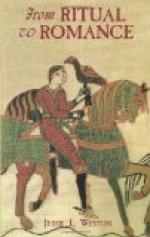I have carefully read Sir W. Ridgeway’s attack on the school in his Dramas and Dramatic Dances, and while the above remarks explain my position with regard to the question as a whole, I would here take the opportunity of stating specifically my grounds for dissenting from certain of the conclusions at which the learned author arrives. I do not wish it to be said: “This is all very well, but Miss Weston ignores the arguments on the other side.” I do not ignore, but I do not admit their validity. It is perfectly obvious that Sir W. Ridgeway’s theory, reduced to abstract terms, would result in the conclusion that all religion is based upon the cult of the Dead, and that men originally knew no gods but their grandfathers, a theory from which as a student of religion I absolutely and entirely dissent. I can understand that such Dead Ancestors can be looked upon as Protectors, or as Benefactors, but I see no ground for supposing that they have ever been regarded as Creators, yet it is precisely as vehicle for the most lofty teaching as to the Cosmic relations existing between God and Man, that these Vegetation cults were employed. The more closely one studies pre-Christian Theology, the more strongly one is impressed with the deeply, and daringly, spiritual character of its speculations, and the more doubtful it appears that such teaching can depend upon the unaided processes of human thought, or can have been evolved from such germs as we find among the supposedly ‘primitive’ peoples, such as e.g. the Australian tribes. Are they really primitive? Or are we dealing, not with the primary elements of religion, but with the disjecta membra of a vanished civilization? Certain it is that so far as historical evidence goes our earliest records point to the recognition of a spiritual, not of a material, origin of the human race; the Sumerian and Babylonian Psalms were not composed by men who believed themselves the descendants of ‘witchetty grubs.’ The Folk practices and ceremonies studied in these pages, the Dances, the rough Dramas, the local and seasonal celebrations, do not represent the material out of which the Attis-Adonis cult was formed, but surviving fragments of a worship from which the higher significance has vanished.
Sir W. Ridgeway is confident that Osiris, Attis, Adonis, were all at one time human beings, whose tragic fate gripped hold of popular imagination, and led to their ultimate deification. The first-named cult stands on a somewhat different basis from the others, the beneficent activities of Osiris being more widely diffused, more universal in their operation. I should be inclined to regard the Egyptian deity primarily as a Culture Hero, rather than a Vegetation God.




